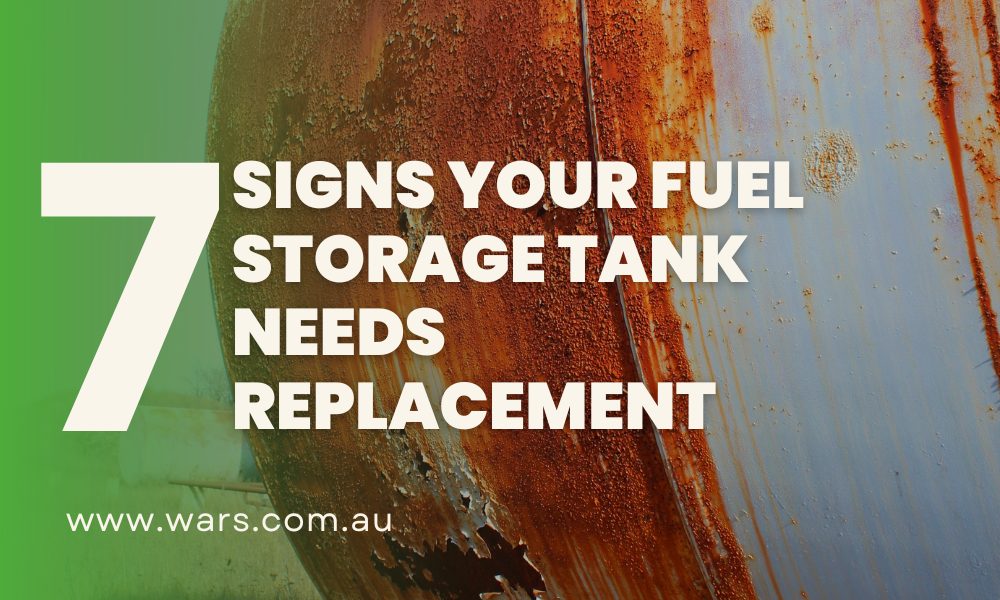
Fuel storage tanks are critical for businesses that rely on a steady supply of fuel for their operations. Over time, these tanks can develop problems that compromise their integrity and efficiency. Knowing the warning signs of a failing fuel tank can prevent costly disruptions and ensure the safe and continuous operation of your business.
At WA Refuelling, we specialise in fuel tank replacement and maintenance in WA, ensuring your fuel storage system remains reliable and efficient. Here are seven signs that indicate it might be time to replace your fuel tank.
Sign 1: Corrosion and Rust
One of the most common fuel tank problems is the presence of corrosion and rust. Over time, moisture and contaminants can cause the tank to corrode, leading to structural weaknesses and potential leaks. Visible rust on the exterior of the tank or flakes of rust in your fuel are clear indicators of internal corrosion. If left unaddressed, corrosion can compromise the tank’s integrity, posing significant safety risks. Regular inspections can help identify early signs of rust, but if corrosion is extensive, it’s time to replace the fuel tank.
Sign 2: Fuel Contamination
Contaminated fuel is a major issue that can affect the performance of your engines and machinery. If you notice sediment, water, or microbial growth in your fuel, it indicates that your tank is no longer providing a clean storage environment. Contaminants can enter through cracks or holes in the tank or result from poor maintenance. Fuel contamination not only reduces fuel efficiency but can also cause significant damage to your equipment. If fuel contamination becomes a recurring problem, consider a fuel tank replacement to ensure the purity of your fuel supply in Perth, WA.
Sign 3: Leaks and Spills
Leaks and spills are critical fuel tank warning signs that require immediate attention. Even small leaks can lead to significant fuel loss and environmental damage. Regularly check for puddles of fuel around the tank or a strong smell of fuel, which can indicate a leak. Advanced detection systems can also help identify leaks early. If you discover a leak, it’s essential to assess the extent of the damage. While minor leaks can sometimes be repaired, extensive damage typically necessitates a complete tank replacement to ensure safety and compliance with environmental regulations.
Sign 4: Structural Damage
Physical damage to the tank, such as dents, cracks, or bulges, can compromise its structural integrity. Such damage is often caused by accidents, extreme weather conditions, or improper handling. Structural issues can lead to leaks, contamination, and even tank failure. Regular visual inspections can help detect these problems early. If you notice any significant structural damage, it’s crucial to replace the fuel tank promptly to avoid operational disruptions and safety hazards.
Sign 5: Age of the Tank
The age of your fuel storage tank is a significant factor in determining its replacement timeline. Most tanks have a lifespan of 15 to 20 years, depending on the material and maintenance practices. As tanks age, they become more susceptible to corrosion, leaks, and other issues. If your tank is approaching or has exceeded its expected lifespan, it’s wise to consider a replacement. Proactively replacing an old tank can prevent unexpected failures and costly emergency repairs.
Sign 6: Inefficient Fuel Usage
If you notice a sudden increase in fuel consumption without a corresponding increase in operational activity, it could be a sign of fuel tank issues. Inefficient fuel usage can result from leaks, contamination, or faulty fuel delivery systems associated with a compromised tank. Monitoring your fuel usage and comparing it to your operational output can help identify inefficiencies. If other potential causes are ruled out, it might be time to replace the fuel tank to restore optimal fuel efficiency.
Sign 7: Frequent Repairs
Frequent repairs and maintenance on your fuel tank are clear indicators that it may be nearing the end of its useful life. While occasional maintenance is normal, consistent problems and the need for repeated repairs can be both costly and disruptive. If you find yourself frequently addressing fuel tank issues, investing in a new tank can be more cost-effective in the long run. A new tank will not only reduce downtime but also provide peace of mind with a reliable fuel storage solution.
How Much Does A Fuel Tank Replacement Cost?
Understanding the fuel tank replacement cost is essential for budgeting and planning. The cost can vary based on factors such as the tank’s size, material, and complexity of installation. While replacing a fuel tank can be a significant investment, it is crucial to weigh this against the potential costs of leaks, contamination, and operational disruptions caused by a failing tank. At WA Refuelling, we provide transparent pricing and work with you to find the most cost-effective solution for your fuel storage needs.
How Long Does It Take to Replace a Fuel Tank?
The time required to replace a fuel tank depends on several factors, including the type and size of the tank, site conditions, and any additional work required, such as soil remediation or system upgrades. On average, a straightforward tank replacement can take a few days to a week. However, more complex projects might extend this timeline. Proper planning and coordination with experienced professionals like those at WA Refuelling can help minimise downtime and ensure a smooth transition to your new tank.
Proactive Fuel Tank Management with WA Refuelling
Maintaining a reliable fuel storage system is vital for the smooth operation of your business. By recognising these fuel tank warning signs and taking proactive steps to replace fuel tanks, when necessary, you can avoid costly disruptions and ensure the safety and efficiency of your operations.
At WA Refuelling, we specialise in fuel tank replacement and offer comprehensive services like fuel tank hire and buy in Perth, WA to address any fuel tank problems you may encounter. Contact us on (08) 9359 1988 to learn more about our solutions and how we can help keep your business running smoothly.
